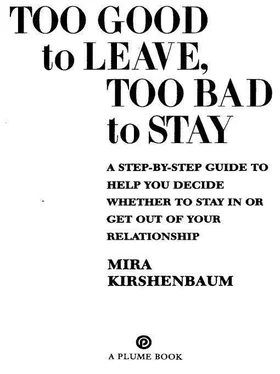Kirshenbaum, Mira - Too Good to Leave, Too Bad to Stay
Здесь есть возможность читать онлайн «Kirshenbaum, Mira - Too Good to Leave, Too Bad to Stay» весь текст электронной книги совершенно бесплатно (целиком полную версию без сокращений). В некоторых случаях можно слушать аудио, скачать через торрент в формате fb2 и присутствует краткое содержание. Жанр: Психология. Описание произведения, (предисловие) а так же отзывы посетителей доступны на портале библиотеки ЛибКат.
- Название:Too Good to Leave, Too Bad to Stay
- Автор:
- Жанр:
- Год:неизвестен
- ISBN:нет данных
- Рейтинг книги:3 / 5. Голосов: 1
-
Избранное:Добавить в избранное
- Отзывы:
-
Ваша оценка:
- 60
- 1
- 2
- 3
- 4
- 5
Too Good to Leave, Too Bad to Stay: краткое содержание, описание и аннотация
Предлагаем к чтению аннотацию, описание, краткое содержание или предисловие (зависит от того, что написал сам автор книги «Too Good to Leave, Too Bad to Stay»). Если вы не нашли необходимую информацию о книге — напишите в комментариях, мы постараемся отыскать её.
Too Good to Leave, Too Bad to Stay — читать онлайн бесплатно полную книгу (весь текст) целиком
Ниже представлен текст книги, разбитый по страницам. Система сохранения места последней прочитанной страницы, позволяет с удобством читать онлайн бесплатно книгу «Too Good to Leave, Too Bad to Stay», без необходимости каждый раз заново искать на чём Вы остановились. Поставьте закладку, и сможете в любой момент перейти на страницу, на которой закончили чтение.
Интервал:
Закладка:
To get right down to brass tacks, I’ve never seen a couple for whom inability to throw lines of communication across the sexual gulf was so severe and so unfixable that they just had to give up on each other, not without a lot of far more serious, far different problems. On the day that heterosexuality itself makes heterosexual relationships impossible, the human race is in big trouble. I don’t think we’re there yet.
The same applies for communication across all of our differences. Talking about differences when it comes to communication is like talking about rivers when it comes to bridges. Rivers are what bridges are designed to cross. And differences are the reason we have communication in the first place.
Crazy Communication
At least it’s fun to talk about “he said, she said.” We get to play “me Tarzan, you Jane,” and that’s always a turn-on. The other pile of candidates is a lot more serious. It’s what I loosely call crazy communication, where confused, unclear, misleading, misconceived words and gestures cause the problems.
I’m not talking about communication by crazy people. I’m talking about communication that makes people crazy. Like when someone talks and you can’t figure out why they’re saying what they’re saying. Or they act like they’re disclosing something but you feel like they’re hiding something. Or they answer something you say but for the life of you you can’t figure out what their answer has to do with what you said. Or they’re telling you something and yet you’re absolutely convinced they’re asking you for something and yet they deny they’re asking you for something.
This is very different from alien communication. Here’s the difference. Alien communication is where one person says there’s a tiger in the grass and the other says grab your gun and the first person says I don’t need you to tell me what to do, I know to get the gun, I need you to understand what I’m going through. Crazy communication is where someone sees a tiger in the grass and says, “What do you think about tigers?” Or you say you see a tiger and as if that would reassure you he says, “What tiger?” or even tries to convince you there is no tiger. Or he sees a tiger and starts talking about how all these tigers make him really sad. Or he sees a tiger and asks you where you put the airline tickets.
Mary and James’s Story
The essence of crazy communication is that when it’s going on you don’t know what the other person is really saying or why they’re saying it. Believe it or not, crazy communication like this is infinitely more common than alien communication. It’s just a lot less noticeable, except when there are tigers around.
Meet Mary and James. They might give you hope. All they had to do was open their mouths and there would be instant total confusion. They always miscommunicated, and yet they never stopped being amazed by their miscommunications because they came from the same Irish Catholic background, same neighborhood, same parish, and had the same friends growing up. Pick either Mary or James, and you’d find someone who made communication messes.
It doesn’t matter whom you start with. This particular example just happens to start with Mary ... or does it?
As a school nurse Mary would be home from work early. As a truck owner-driver James would show up later. On this particular day, he brought his rig home, turned it off, and just sat in it. Mary saw this and wondered why he wasn’t coming in. Then she started getting suspicious. Was he hiding? she wondered. Was he afraid? There was crazy communication already and no one had said a word.
After a while James finally walked through the front door. Money’d been tight, he was supposed to have gotten paid, and his sitting in the truck had made her nervous, so Mary led off with, “Did you get the check?”
This was crazy. You’re supposed to say, “Hi, honey, how was your day?” aren’t you? Why would she have asked about the check like that if she didn’t want to open hostilities, James and others among us might wonder, even though we understand her anxiety.
“What check?” James said. He’s got the check in his pocket! But he already feels third-degreed and mistrusted. He acts like he’s got to defend himself even though there’s nothing to defend.
This, too, was crazy. So what if she threw him with her question? He could’ve answered it anyway. He could’ve said it made him mad. But he shouldn’t have spun off in his own crazy direction. I can tell you from my own direct clinical experience that those five words— where’s the check? what check?— started the biggest fight that had absolutely no content or direction that you can imagine.
But as bad a problem as this is, it is fixable. James and Mary eventually learned to communicate beautifully. This kind or any kind of crazy communication is just not necessarily in itself a sign of a relationship that’s too bad to stay in. It’s not always fixable and it can sometimes destroy a relationship, but if there’s crazy communication (and I’ve seen few relationships without it), you can go on to discover how much amazing progress you can make toward learning to communicate in a healthy way.
So we’ve found that some of the conventional wisdom about how poor communication destroys relationships is wrong. What then are the real culprits?
STEP #9: OFF-THE-TABLE-ITIS
There’s a kind of regenerative property in healthy communication, something in it that allows it to function as the interpersonal equivalent of whatever it is that allows a starfish to grow a new point when one breaks off. This regenerative property exists even in the face of obstacles like alien communication and crazy communication.
You can see a really good fictional example of this regenerative property in the movie Enemy Mine, directed by Wolfgang Petersen and starring Dennis Quaid and Lou Gossett, Jr. It’s about two space travelers from warring planets who get stranded on some asteroid together, just the two of them. Not only can’t they speak the other’s language, but they’re of different species and each has a mandate to kill the other. But because of communication’s awesome ability to build bridges across distances and difficulties, they’re eventually able to talk to each other and build a good working relationship.
The movie may be science fiction, but the principle it illustrates is pure science. I arrived in this country as a little girl of four speaking no English. I was immediately put in a nursery school with other kids from other countries. Almost none of us spoke each other’s language. Yet within weeks, even days, we were all bridging every imaginable gap of background and culture and playing together like kids who’d all been born on the same block.
This brings me back to my search for the diagnostic needle in the haystack of communication. I realized that if there were something about communication that made a relationship too bad to stay in, it would have to be something that damaged its regenerative capacity. It would have to be something that damaged communication’s bridge-building function. And in fact my work with men and women who were going through what you’re going through has shown me that my hunch was absolutely correct.
Do you want to find a true villain in the drama of communication? Look at what I call off-the-table-itis. This comes from an expression people use in talking about negotiation. It refers to someone taking something “off the table” when he doesn’t want to talk about an issue. Off-the-table-itis occurs when someone keeps taking things off the table, when someone keeps not wanting to talk about issues.
Читать дальшеИнтервал:
Закладка:
Похожие книги на «Too Good to Leave, Too Bad to Stay»
Представляем Вашему вниманию похожие книги на «Too Good to Leave, Too Bad to Stay» списком для выбора. Мы отобрали схожую по названию и смыслу литературу в надежде предоставить читателям больше вариантов отыскать новые, интересные, ещё непрочитанные произведения.
Обсуждение, отзывы о книге «Too Good to Leave, Too Bad to Stay» и просто собственные мнения читателей. Оставьте ваши комментарии, напишите, что Вы думаете о произведении, его смысле или главных героях. Укажите что конкретно понравилось, а что нет, и почему Вы так считаете.












